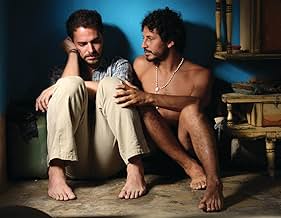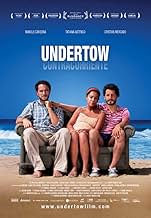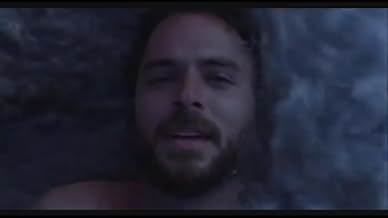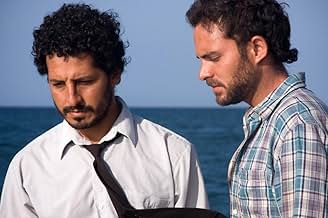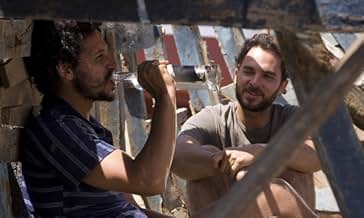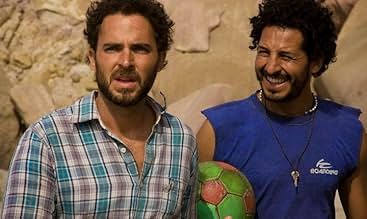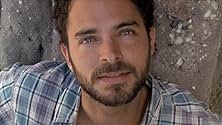CALIFICACIÓN DE IMDb
7.7/10
7.4 k
TU CALIFICACIÓN
Una inusual historia de fantasmas ambientada en la costa peruana; un pescador casado lucha por conciliar su devoción por su amante masculino con las estrictas tradiciones de su pueblo.Una inusual historia de fantasmas ambientada en la costa peruana; un pescador casado lucha por conciliar su devoción por su amante masculino con las estrictas tradiciones de su pueblo.Una inusual historia de fantasmas ambientada en la costa peruana; un pescador casado lucha por conciliar su devoción por su amante masculino con las estrictas tradiciones de su pueblo.
- Dirección
- Guionista
- Elenco
- Premios
- 13 premios ganados y 13 nominaciones en total
Humberto Cavero
- Padre Juan
- (as Julio Humberto Cavero)
Liliana Alegría
- Carlota
- (as Liliana Alegria Saavedra)
Tomas Fernandez
- Sabino
- (as Tomás Fernández)
- Dirección
- Guionista
- Todo el elenco y el equipo
- Producción, taquilla y más en IMDbPro
Opiniones destacadas
There are lots of things that are not told to us in the beginning or middle of this movie. We do not know who are the characters, where they came from or how they started their relationships. The truth is, we do not need to know that. What we need and by the end of the movie what we want to acknowledge is that this is a movie about love (or different types of love). A movie about grieve and it's most different ways of being expressed. A movie about people and about the way they struggle through their lives to hide what they really are and what or who they really role. This is a movie about loss and pain and also about joy and happiness. In the end, this a movie about being human.
The script is remarkable and it runs away from the clichés and the preconceived ideas you might take while you are walking in the projection room. But even more remarkable are the 3 main characters and the actors who portray them. Cristian Mercado delivers a masterclass in acting. By a comfortable mile, one of the best male acting performances of the year. What is most admirable is the way Mercado can express Miguel's painful grievance: the loss of his lover, the acceptance of what he really his and the loss of his beloved wife and son - there are no hysteric portraits of loss. What you get to see is a outstanding performance focused on the facial and physical expression. Also fantastic the the performance by the Mexican actress Tatiana Astengo.
Could this be one of the front runners for the Best Foreing Language movie of the year? No doubt about it.
The script is remarkable and it runs away from the clichés and the preconceived ideas you might take while you are walking in the projection room. But even more remarkable are the 3 main characters and the actors who portray them. Cristian Mercado delivers a masterclass in acting. By a comfortable mile, one of the best male acting performances of the year. What is most admirable is the way Mercado can express Miguel's painful grievance: the loss of his lover, the acceptance of what he really his and the loss of his beloved wife and son - there are no hysteric portraits of loss. What you get to see is a outstanding performance focused on the facial and physical expression. Also fantastic the the performance by the Mexican actress Tatiana Astengo.
Could this be one of the front runners for the Best Foreing Language movie of the year? No doubt about it.
In early 2010, the first Peruvian film ever nominated for a Foreign Language Film Oscar -- "Milk Of Sorrow" (2009) -- got a U.S. 2-screen release that grossed all of 10K. Clearly UNDERTOW has no Peruvian coattails to ride in on. Despite Sundance kudos and buzz, it's already being ghettoized as a gay film. Yet it clearly is so much more. UNDERTOW doubly violates that genre's political correctness: the lead is both closeted and heroic while the captivating tale constantly eschews white/urbane predictability. We watch two more curve balls being thrown at us as well: next-world fantasy and 3rd world folklore. So this is definitely not "'Brokeback Mountain' meets 'Ghost'" as several critics have written it off in facile reviewer shorthand. But UNDERTOW may well have the power to connect with portions of the mainstream audiences for both of those films -- via word of mouth, curiosity-building press and guerrilla marketing. Our unexpected attraction to a real-life subsistence-poor fishing village and its close-knit, tradition-bound "primitive" citizens are seamlessly woven into the film's cast as well as fabric. Breath-taking cinematography, a script illuminating characters rather than telescoping plot, understated yet powerful performances and a hypnotic world music soundtrack take UNDERTOW far beyond the shorelines of dry-docked movie-making. Many high-concept films have dealt with men forced to choose between family and lovers. Others have pitted unlikely heroes against the mores of society. Nor is a quest to carry out the final wishes of the dearly departed at all innovative. But UNDERTOW combines these themes in a way no writer- director has done before. First-timer Javier Fuentes-León does so with fearless honesty and sublime-on-a-shoestring craft. No surprise then that it's this year's Foreign Language entry from Peru.
Contracorriente (Undertow) is simply a gem of beautifully shot pictures, perfectly cast actors, an extraordinarily well written script and masterful direction.
I did not initially expect Contracorriente to be a movie that would haunt me for days after watching it, as it seemed to be a perfectly straight forward story judging from the text on the back of the DVD-case. I was even a bit worried that it might be cliché or simply cheesy. It was not however. Not more than a few minutes into the movie I started to suspect that I might have grossly misjudged the nature of the film and I was happy to be proved wrong.
The locations, the people, the acting, the language were all so beautiful and the very delicate and slowly evolving story made for so much more than simple entertainment. Especially the subtle hint of possibility in the ending left a very warm and hopeful feeling but the movie as a whole makes a very strong and lasting impression.
I was very moved by this movie and the very strong statement that it makes and a variety of the most beautiful and strong scenes have stayed in my thoughts for days on end for both the sad parts and the joyous moments.
I can only recommend that you watch it if you haven't already - and I am looking forward to seeing it again soon myself and expect it to be something that I will do more than once.
I did not initially expect Contracorriente to be a movie that would haunt me for days after watching it, as it seemed to be a perfectly straight forward story judging from the text on the back of the DVD-case. I was even a bit worried that it might be cliché or simply cheesy. It was not however. Not more than a few minutes into the movie I started to suspect that I might have grossly misjudged the nature of the film and I was happy to be proved wrong.
The locations, the people, the acting, the language were all so beautiful and the very delicate and slowly evolving story made for so much more than simple entertainment. Especially the subtle hint of possibility in the ending left a very warm and hopeful feeling but the movie as a whole makes a very strong and lasting impression.
I was very moved by this movie and the very strong statement that it makes and a variety of the most beautiful and strong scenes have stayed in my thoughts for days on end for both the sad parts and the joyous moments.
I can only recommend that you watch it if you haven't already - and I am looking forward to seeing it again soon myself and expect it to be something that I will do more than once.
One of the best new films exploring gay male identity, love and relationships, and likely will be a worthy addition to many personal "favorite gay films" lists, although the fact that the film is set in a town, and to some extent a culture, where, at least for a large part of the story, many in the town have not yet evolved in their views of LGBT people and issues, created some (ultimate unnecessary) anxiety for me early in the film, and at parts throughout, as to whether the film would be a throwback to older, more stereotyped and limited representations and stories of gay life, although those anxieties were not only relieved by the end of the film, but, as I suggested, the film is an extremely valuable addition to the new wave of gay cinema.
The writer, director, casting director and cast, cinematographer, set designer and other members of the film-making team also do a great job exploring rural, small town life, with its traditions (religious and otherwise...) superstitions, and class differences, and the interplay among the individuals, families and community who inhabit the town, along with the welcome (or rejection...) given to a stranger who comes there, and who many perceive as a threat to the social fabric of the town, and the support (or lack of it...) the townspeople and characters show to each other, ultimately examining the struggle between bigotry and ignorance, on the one hand, and the struggle to overcome that bigotry and ignorance, and replace it with support, respect and love on the other. Most of the townspeople are not financially well-off, but make just enough to get by, working in occupations connected to fishing and the sea, and the way they relate, individually and as a community, to each other (and to themselves, in regard to what is the true definition of a man, of an individual's self-respect) in light of a newcomer who is more financially well-off, and his artistic and suspected sexual/relationship interests, are additional themes of the film, which play out so well in a beautiful, interesting and captivating way, often evoking strong emotions, and at times offering an inspiring catharsis (and perhaps a few tears, in reaction to some sadness, and much beauty.)
And there are many other highlights of the film beyond all that, including the amazingly beautiful setting, in a rural, seaside Peruvian village, the cinematography, musical score, performances, plot twists and turns, the mix of fantasy and reality (and moments where it's unclear to what extent fantasy exists as an aspect of the story's reality.) This is a truly unique and creative film, and one of the most rewarding experiences I've had at a feature film in a long time.
The writer, director, casting director and cast, cinematographer, set designer and other members of the film-making team also do a great job exploring rural, small town life, with its traditions (religious and otherwise...) superstitions, and class differences, and the interplay among the individuals, families and community who inhabit the town, along with the welcome (or rejection...) given to a stranger who comes there, and who many perceive as a threat to the social fabric of the town, and the support (or lack of it...) the townspeople and characters show to each other, ultimately examining the struggle between bigotry and ignorance, on the one hand, and the struggle to overcome that bigotry and ignorance, and replace it with support, respect and love on the other. Most of the townspeople are not financially well-off, but make just enough to get by, working in occupations connected to fishing and the sea, and the way they relate, individually and as a community, to each other (and to themselves, in regard to what is the true definition of a man, of an individual's self-respect) in light of a newcomer who is more financially well-off, and his artistic and suspected sexual/relationship interests, are additional themes of the film, which play out so well in a beautiful, interesting and captivating way, often evoking strong emotions, and at times offering an inspiring catharsis (and perhaps a few tears, in reaction to some sadness, and much beauty.)
And there are many other highlights of the film beyond all that, including the amazingly beautiful setting, in a rural, seaside Peruvian village, the cinematography, musical score, performances, plot twists and turns, the mix of fantasy and reality (and moments where it's unclear to what extent fantasy exists as an aspect of the story's reality.) This is a truly unique and creative film, and one of the most rewarding experiences I've had at a feature film in a long time.
" Undertow", gut-wrenching and quietly powerful Peruvian movie, brings back the faith in the power of story telling. This forgotten art seems to have passed by most of our contemporary film-makers. Luckily it didn't Javier Funtes-Leon. Small fishing village seemingly locked in time capsule. Grueling work, old-time believes, church on Sundays and communal meal after. Everybody knows everybody, or do they? Small towns, like little tribes, include all members of its community.Up to a point. As long as you play by their traditional rules, you'll be fine. But, just try to step out of the rhythm of the tribal tune, and they turn on you. Of course, this is a movie about a repression of gay people and the horrors they have to endure just because they are different. But, it is so much more. The indictment of empty traditions, false morals and greatest possible cheer for personal courage. This is the life we have, these are the cards we are dealt and play we must.With our head up high and damn the consequences, or hiding and trying to please all but yourself. Doesn't seems such a hard choice to me, or is it?
¿Sabías que…?
- TriviaAlthough both main characters are Peruvian, the actors who play them are not. Cristian Mercado (the Fisherman) is Bolivian and Manolo Cardona (the Photographer) is Colombian.
- ConexionesFeatures Direito de Amar (1987)
Selecciones populares
Inicia sesión para calificar y agrega a la lista de videos para obtener recomendaciones personalizadas
- How long is Undertow?Con tecnología de Alexa
Detalles
- Fecha de lanzamiento
- Países de origen
- Sitios oficiales
- Idioma
- También se conoce como
- Undertow
- Locaciones de filmación
- Productoras
- Ver más créditos de la compañía en IMDbPro
Taquilla
- Total en EE. UU. y Canadá
- USD 108,620
- Fin de semana de estreno en EE. UU. y Canadá
- USD 6,749
- 19 sep 2010
- Total a nivel mundial
- USD 602,059
Contribuir a esta página
Sugiere una edición o agrega el contenido que falta


